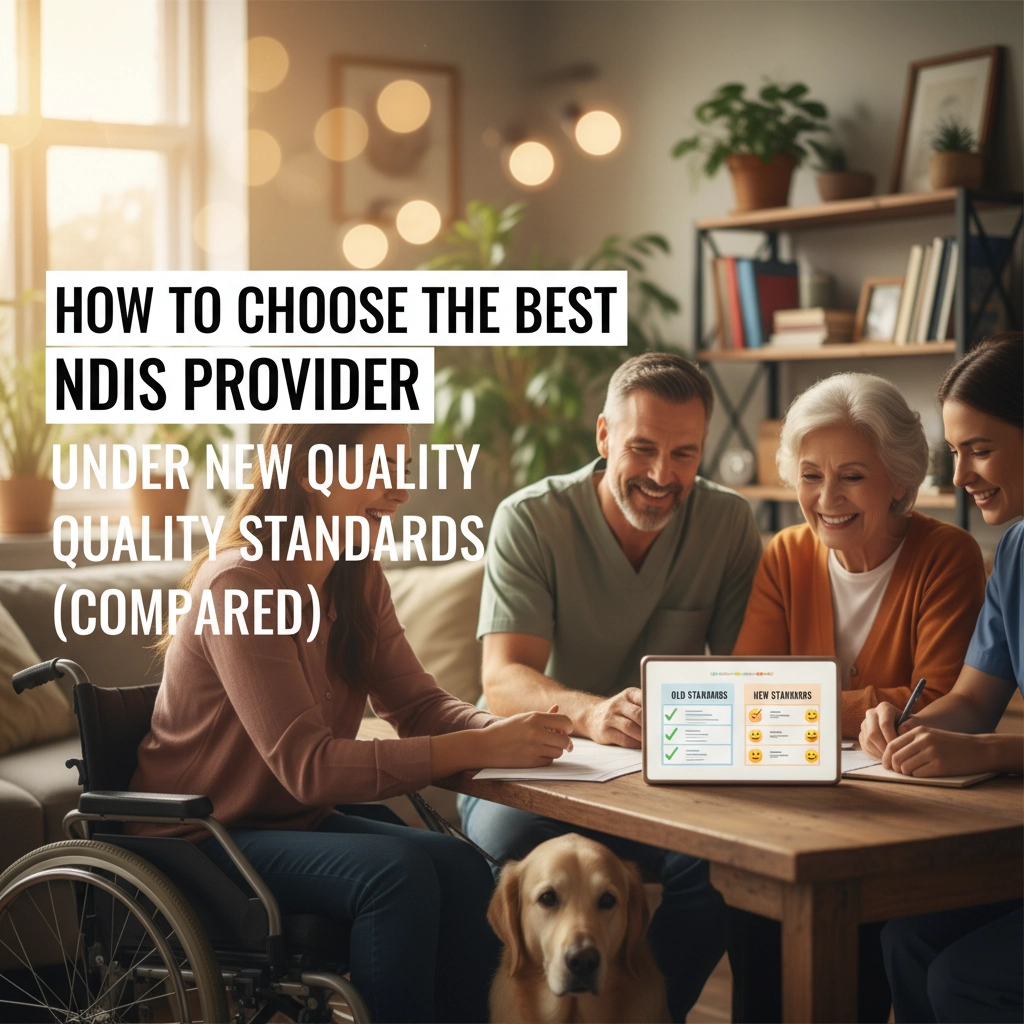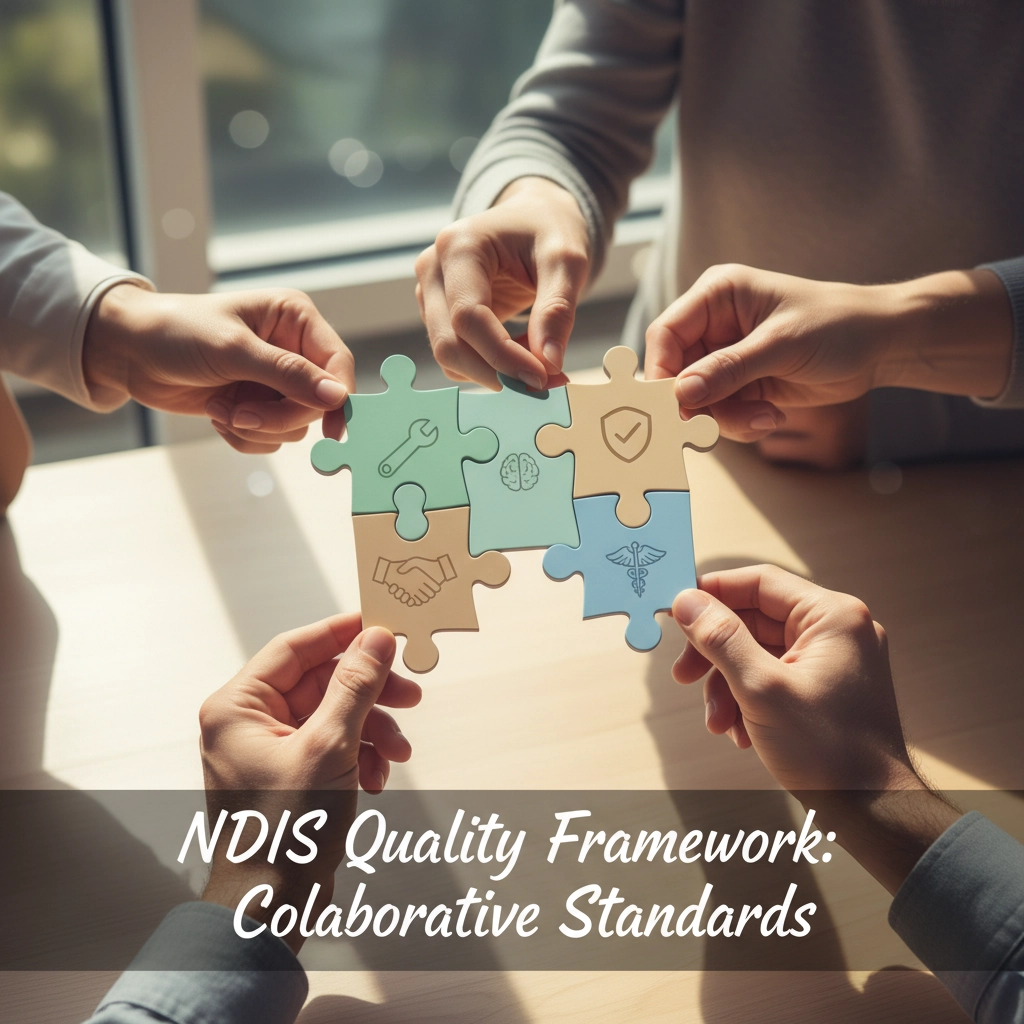How to Choose the Best NDIS Provider Under New Quality Standards (Compared)

Navigating the NDIS provider landscape has become more complex with evolving quality standards, but that's actually great news for participants. These changes mean better protection, clearer expectations, and higher-quality supports across the board. The challenge? Knowing how to choose the right provider when there are so many factors to consider.
Whether you're new to the NDIS or looking to switch providers, understanding how quality standards impact your choices is crucial. Let's break down what you need to know to make an informed decision that truly supports your goals.
What's Changed with NDIS Quality Standards?
The NDIS Practice Standards now operate through a modular system that's more targeted than previous approaches. Core modules apply to all registered providers delivering higher-risk supports, while supplementary modules depend on specific service types. There's also a verification module that covers lower-risk services.
This framework focuses on four key areas: governance, participant rights, service delivery, and risk management. What this means for you is that providers must demonstrate they can safely and effectively deliver the supports you need, with proper oversight and accountability measures in place.

The biggest shift is how providers are held accountable. Registered providers undergo regular audits, must renew their registration every three years, and face consequences if they don't meet standards. This creates a safety net that wasn't as robust in the past.
Registered vs Unregistered Providers: The Real Differences
Registered Providers must meet government quality and safety standards. They undergo regular audits, maintain comprehensive insurance coverage, and have established policies for incident management. Their staff must have appropriate qualifications and background checks, including Working with Children and National Police Checks.
Unregistered Providers offer more flexibility in service delivery and pricing, but they're self-regulated. While many unregistered providers deliver excellent services, they're not subject to the same standardized quality benchmarks or oversight mechanisms.
The choice between registered and unregistered providers isn't necessarily about one being "better" than the other – it's about understanding the trade-offs and choosing what aligns with your needs, risk tolerance, and support goals.
Key Factors to Evaluate When Choosing Your Provider
Service Specialization and Track Record
Look for providers with demonstrated experience in services relevant to your specific needs. A provider specializing in autism support may not be the best choice for physical therapy services, even if they're registered and compliant. Ask about their staff's qualifications, training, and experience with participants who have similar goals to yours.
Geographic Accessibility and Service Delivery Options
Location matters, especially for regular in-person support. Consider providers' service areas, availability schedules, and whether they offer telehealth options when appropriate. Some providers now offer hybrid models that combine in-person and remote support, which can be particularly valuable for therapy services or skill development.

Communication and Cultural Compatibility
Quality standards require providers to respect participant rights and preferences, but the practical application varies. Consider whether the provider can accommodate cultural, linguistic, or gender-specific preferences. Their approach to communication – whether they listen actively, respond promptly, and involve you in decision-making – is crucial for building an effective support relationship.
Flexibility and Adaptability
Your needs may change over time, and quality providers should be able to adapt their services accordingly. Ask how they handle plan changes, goal adjustments, and evolving support requirements. Providers who demonstrate flexibility while maintaining compliance with quality standards offer the best long-term value.
Comparing Provider Selection Approaches
| Approach | Benefits | Considerations | Best For |
|---|---|---|---|
| All Registered Providers | Maximum compliance assurance, standardized quality | May be more expensive, less flexibility | High-support needs, risk-averse participants |
| All Unregistered Providers | Greater flexibility, potentially lower costs | Variable quality, less oversight | Experienced participants, specific cultural needs |
| Hybrid Approach | Balanced cost and quality, tailored solutions | Requires more research and management | Most participants seeking optimal value |
Your Step-by-Step Provider Selection Process
Step 1: Define Your Support Requirements
Start by clearly identifying your goals and the specific supports you need. Consider both immediate needs and longer-term objectives. Think about practical factors like scheduling preferences, location requirements, and any specific accommodations you might need.
Step 2: Research and Shortlist Providers
Create a list of potential providers in your area and investigate their credentials. Check their registration status with the NDIS Commission, review their experience with your specific needs, and look into their compliance history. Don't forget to read testimonials and feedback from other participants.

Step 3: Evaluate Service Integration
Consider whether providers can offer comprehensive services across different support categories. Having fewer providers can mean better coordination and consistency, but it shouldn't come at the expense of specialized expertise where you need it.
Step 4: Conduct Direct Assessments
Contact your shortlisted providers directly. Ask about their approach to service delivery, how they handle challenges, and what makes them different from other providers. Pay attention to how they communicate during this process – it's often a good indicator of their ongoing service quality.
Tailored Recommendations for Different Situations
For Participants with High-Support Needs
Prioritize registered providers with specialized experience in your disability type and strong compliance records. Look for those with comprehensive risk management protocols, 24/7 availability, and established relationships with healthcare professionals. Quality standards are particularly important when dealing with complex medical needs or behavioral challenges.
For Those Building Independence Skills
Choose providers with proven track records in skill-building and community integration. Look for those offering flexible service delivery models that can adapt as your independence grows. These providers should demonstrate experience in gradually reducing support intensity while maintaining safety and progress toward goals.
for Specialized Therapy Requirements
Focus on providers with specific therapeutic expertise and appropriate professional credentials. Ensure they maintain current practice standards and offer evidence-based interventions. Don't compromise on specialization for the sake of convenience – specialized therapy often requires specific qualifications and experience.
For Budget-Conscious Participants
Consider a carefully planned hybrid approach. Use registered providers for high-risk supports where quality standards provide crucial safety nets, and carefully vetted unregistered providers for lower-risk services where you want more flexibility or cost savings.
Making the Final Decision
Remember that choosing a provider isn't a permanent decision. If your current provider isn't meeting your needs or you're not satisfied with their service quality, you can change providers. However, making an informed initial choice based on quality standards and your specific needs can save time, frustration, and potentially improve your outcomes.
The goal isn't to find the "perfect" provider – it's to find one that aligns with your needs, values, and goals while meeting appropriate quality standards for the supports you require.
At Raya Healthcare, we understand that choosing the right provider can feel overwhelming. Our support coordination services can help you navigate these decisions and ensure your supports work together effectively to achieve your goals.
Quality standards exist to protect and empower you as an NDIS participant. Use them as a tool to make informed decisions, but don't let them overwhelm you. Focus on finding providers who combine compliance with genuine commitment to supporting your journey toward greater independence and quality of life.
